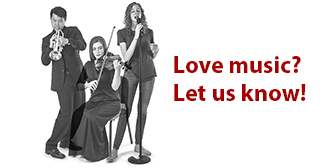Music Therapy
Music therapists use music to impact the lives of people with diverse needs and backgrounds. Music therapists are licensed by state agencies. This pre-professional program is designed to prepare students to enter Masters Equivalency programs in music therapy. Each university with a Masters Equivalency program in music therapy is different. These recommended courses correspond to the requirements for the music therapy equivalency program at the University of Iowa. It is recommended that students work with their adviser to research the graduate school of their choice and adjust the recommended courses based on that choice.
Recommended courses:
(In addition to the music major, 8 credits of music courses (MUS226, 246, 261 & 303), including 1 credit of ensemble and 2 credits of lessons)
BIO 102SN - Introduction to Human Anatomy and Physiology
(4 credits) (NWCore option under Science and the Natural World) An introduction to the structure and function of the human body.Note: Includes 1 1/2 hours of lab per week. Does not count toward a biology major or minor. A fee is associated with this course.
MUS 226 - Methods of Teaching Percussion Instruments
(1 credit; alternate years, consult department) This course is required for students who have selected a career concentration in instrumental music education. Students will acquire a basic playing facility for at least two instruments in each generic category. The course will familiarize students with concepts and procedures that will enable them to teach wind, percussion, and string instruments to students at the elementary and secondary levels.
MUS 246 - Music Ministry Guitar
(1-2 credits) Private instruction. Prerequisite: permission of instructor.Note: Lessons are 30 minutes in length. Lessons are offered every term and may be repeated. MUS252, Lead Sheet Piano does not count toward class or private instruction in piano requirement for majors or minors. An advanced student may elect to take an hour lesson each week in his/her major area of performance. Practice and repertoire requirements are doubled.
MUS 261 - Voice
(1-2 credits) Private instruction. Prerequisite: permission of instructor.Note: Lessons are 30 minutes in length. Lessons are offered every term and may be repeated. An advanced student may elect to take an hour lesson each week in his/her major area of performance. Practice and repertoire requirements are doubled.
MUS 303 - Orchestration
No course description available.
PSY 100SS - Exploring Psychology
(4 credits) (NWCore option under Self and Society) In this course students learn how, using methodologies such as observation, survey and experimentation, psychological science explores the causes and consequences of human action. An overview of major findings from the field of psychology such as biological bases of behavior, learning and memory, motivation and emotion, human development, personality, intelligence, psychopathology and therapy, the effect ofothers on individuals will be discussed and students will be encouraged to apply this knowledge to their own views and actions. Students will consider why the integration of faith and science in understanding humans is important and will explore ways of accomplishing this integration.
PSY 360 - Psychopathology
(4 credits) This course will provide a broad survey of what is considered to be disordered in behavior, emotional expression, and cognition in adults. Emphasis will be placed on a scientific view of psychopathology. The two main foci of the course are the (a) description of various behaviors, symptoms, syndromes and illnesses as described in the most recent edition of the Diagnostic and Statistical Manual (DSM) of the American Psychiatric Association, and (b) research and theories concerning etiology including discussion of environmental, biological, social and interactive perspectives. While intervention and childhood disorders will be discussed, they are not the primary focus of this course. Prerequisite: 4 credits of psychology courses.
Choose one course:
EDU 206 - Survey of Exceptional Individuals
(3 credits) This course provides an overview of the history of special education up to and including present day trends and practices in education students with exceptionalities. Various areas of exceptionality are explored, including ways to support students with diverse learning and behavioral needs in inclusionary environments.Note: This course includes a field experience. Students must earn a C- or better in order to fulfill program requirements for elementary licensure.
PSY 214x - Social Psychology
(4 credits) This course involves the study of the way individuals think about, influence and relate to one another. Topics include: attitude change, social thinking, conformity, obedience, persuasion, prejudice, aggression, altruism, roles, norms and environmental influences on social behavior. The major aim of the course is to encourage an appreciation of the relationship between personal and situational determinants of social behavior. Prerequisite: PSY100SS, 221SS, or SOC101SS.Cross-Referenced: Cross-referenced in sociology.
SOC 214x - Social Psychology
(4 credits) This course involves the study of the way individuals think about, influence and relate to one another. Topics include: attitude change, social thinking, conformity, obedience, persuasion, prejudice, aggression, altruism, roles, norms and environmental influences on social behavior. The major aim of the course is to encourage an appreciation of the relationship between personal and situational determinants of social behavior. Prerequisite: PSY100SS, 221SS, or SOC101SS.Cross-Referenced: Cross-referenced in psychology.
PSY 221SS - Developmental Psychology: Childhood
(4 credits ) (NWCore option under Self and Society) This course explores the development of the child from the prenatal period into adolescence. Children's physical, cognitive, emotional, personality, social, moral and faith development is examined. Psychological research methods for studying children are covered.
SOC 101SS - Principles of Sociology
(4 credits) (NWCore option under Self and Society) An introduction to sociology, its major concepts, tools and perspectives. This course provides an understanding of societies; of culture; of major social institutions such as the family, religion and education; of social inequality; and of social change.

